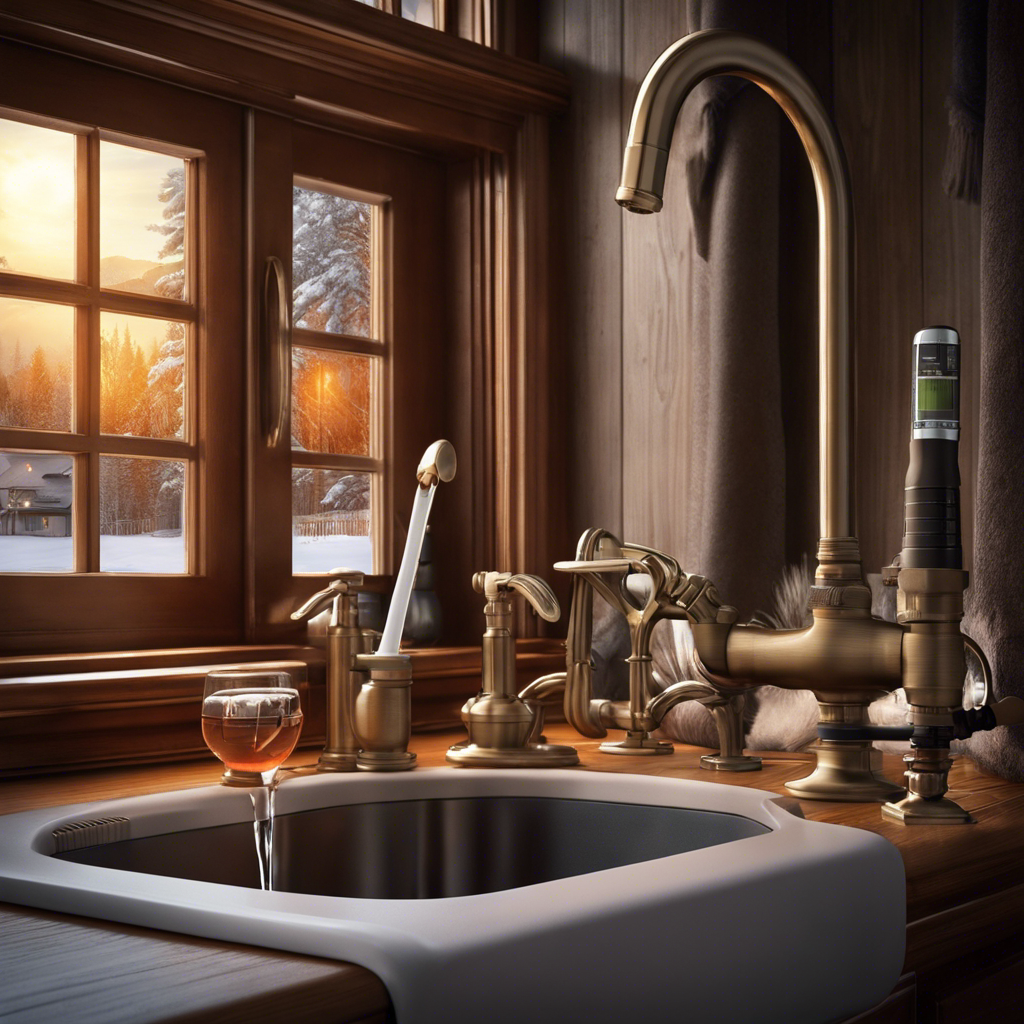Imagine waking up on a frigid winter morning, ready to start your day, only to find that your pipes have frozen overnight. The inconvenience and potential damage caused by frozen pipes can be a nightmare for any homeowner.
But fear not, because in this discussion, we will explore effective strategies to prevent frozen pipes and tackle other winter plumbing issues head-on. By following these simple yet crucial steps, you can safeguard your home and ensure a stress-free winter season.
So, let’s dive in and discover how you can protect your pipes from the icy grip of winter.
Key Takeaways
- Insulate pipes using foam, fiberglass, or rubber to prevent freezing and bursting.
- Maintain a consistent temperature between 60 and 68 degrees Fahrenheit to prevent freezing without excessive energy consumption.
- Let faucets drip to keep water moving and maintain a consistent temperature, reducing the risk of freezing and bursting.
- Disconnect outdoor hoses, turn off the water supply, and drain remaining water to prevent bursting due to freezing and expansion.
Insulate Your Pipes
To prevent winter plumbing issues, it’s important to insulate your pipes. Pipe insulation offers numerous benefits that can help you avoid costly repairs and damage to your plumbing system.
First and foremost, insulation helps to prevent your pipes from freezing during cold weather. When water freezes inside pipes, it can expand and cause them to burst, leading to leaks and flooding. By insulating your pipes, you create a protective barrier that helps retain heat and prevent freezing.
There are different types of pipe insulation available, such as foam, fiberglass, and rubber. Foam insulation is commonly used and is easy to install. Fiberglass insulation provides excellent thermal protection, while rubber insulation is resistant to moisture and can be used in damp areas.
Choose the insulation type that best suits your needs and ensure it’s properly installed to enjoy the benefits and avoid winter plumbing issues.
Maintain a Consistent Temperature
Now that your pipes are properly insulated, it’s crucial to maintain a consistent temperature in your home to prevent winter plumbing issues.
Adjusting your thermostat is an effective way to achieve this. Set it to a temperature that keeps your home warm enough to prevent freezing, but not too high that it becomes inefficient and costly. Aim for a temperature between 60 and 68 degrees Fahrenheit.
Additionally, consider using space heaters strategically to provide extra warmth in areas that are prone to cold drafts or have exposed pipes. Remember to follow safety guidelines when using space heaters, such as keeping them at least three feet away from any flammable materials.
Keep Faucets Dripping
Consider letting your faucets drip during the winter months to prevent plumbing issues. While it may seem counterintuitive to let water run, a slow drip can actually help you avoid frozen pipes and potential damage.
Not only does this practice promote water conservation, but it also offers several benefits. The constant movement of water prevents it from sitting stagnant in the pipes, reducing the chances of freezing. The slow flow of water helps to maintain a consistent temperature, preventing pipes from reaching the freezing point.
Additionally, the steady drip relieves pressure that can build up in the pipes, reducing the risk of bursting. By implementing this simple step, you can protect your plumbing system and ease your worries during the winter months.
Disconnect Outdoor Hoses
To protect your plumbing system during the winter months, it’s important to disconnect your outdoor hoses.
When temperatures drop, any water left in the hose can freeze and expand, causing the hose to burst. This can lead to significant water damage and costly repairs.
To prevent this, start by turning off the water supply to the outdoor faucet. Then, detach the hose from the faucet and drain any remaining water by holding it at a downward angle.
Once the hose is empty, coil it up and store it in a dry place, such as a shed or garage.
Seek Professional Help
If you encounter complex or persistent plumbing issues during the winter months, it’s advisable to seek the assistance of a professional plumber. Knowing when to call for professional help can save you time, money, and potential damage to your home.
While some minor plumbing issues can be fixed with DIY solutions, more serious problems require the expertise of a trained professional. When choosing a plumber, it’s crucial to find reliable professionals who are licensed, insured, and have a good reputation in the industry. You can start by asking for recommendations from friends, family, or neighbors who’ve had similar plumbing issues. Additionally, online reviews and ratings can provide valuable insights into the quality of service provided by different plumbers.
Frequently Asked Questions
How Do I Know if My Pipes Are Properly Insulated?
If you’re wondering if your pipes are properly insulated, there are a few signs to look out for. Poor insulation can lead to higher energy bills, inconsistent water temperatures, and even frozen pipes. Make sure to check for any visible gaps or cracks in the insulation and consider adding more if needed.
Can I Use Any Type of Insulation for My Pipes?
You can use various types of insulation for your pipes, each with its pros and cons. Some options include foam insulation, fiberglass, and heat tape. It’s important to choose the right one for your specific needs.
What Is the Ideal Temperature to Maintain in My Home During Winter to Prevent Frozen Pipes?
To prevent frozen pipes, you should maintain an ideal home temperature during winter. By keeping your thermostat set above 55 degrees Fahrenheit, you can ensure that your pipes stay warm and avoid any freezing issues.
Do I Need to Keep All Faucets Dripping or Only Certain Ones?
To prevent frozen pipes, it’s important to keep faucets dripping during winter. This small step can help maintain water flow and prevent freezing. Follow these winter plumbing tips for faucet maintenance and avoid costly plumbing issues.
Should I Disconnect Outdoor Hoses Even if They Are Not in Use During Winter?
To prevent potential damage, it’s essential to disconnect outdoor hoses and winterize outdoor faucets. Even if they’re not in use during winter, disconnecting hoses will prevent water from freezing and causing plumbing issues.


